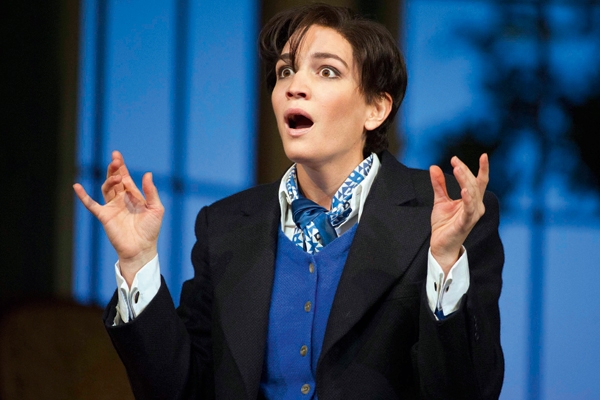Richard Strauss’s Ariadne auf Naxos should be the perfect Glyndebourne opera, not too long, not too demanding, a unique and cunning mixture of seriousness and comedy, plenty to think about if you’re inclined to do that, nothing to oppress you, almost no longueurs — though I might take that back later; and a giddy ending. So it is quite a coup to come up with an account that offers almost no pleasure, whether from the pit, from the voices, from the stage; which seems empty and pretentious in a way quite different from what Strauss can all too often manage; where the humour is leaden and the seriousness has been mislaid, so that it makes — remembering always the journeys to and from the place, which mean that for almost anyone a visit to Glyndebourne is a full-day affair — for an infuriated sense of expensively wasted time.
The first mistake was to get Katharina Thoma, a relatively inexperienced German, to direct. In an interview in the programme book, she says, ‘Sometimes when I leave the theatre and see the news, and there are catastrophes, I think, what have I been worrying about? There are more important matters in the world.’ So, she continues, she has set the opera in 1940, in a country house doubling as a hospital. If you’re as confused as that, you should get a different kind of work altogether. Ariadne, the Prologue and the Drama, are not set in or about 1940, and to move them to that date is to take away their subject and try to make them shed light on something else — the artist’s relationship to contemporary social and political reality — which they aren’t in the least able to do. Thoma might try, before she continues to emulate her notorious colleagues in Regietheater, to find out — say by reading the correspondence of Strauss and his librettist von Hofmannsthal — what the creators of the work were up to, before she decides that there are more serious things and that she is going to wrench anything she comes across to flaunt her devotion to them.
The Prologue, in which the horrified Composer learns that her tragic drama Ariadne auf Naxos is to be performed simultaneously with a commedia dell’arte group, so that the ‘entertainment’ is over in time for the rich man’s firework display, can scarcely go wrong, even when relocated in somewhere very like Glyndebourne in 1940, with planes overhead and an air-raid just before the end, which enjoyably ignites the scenery. That this short Prologue — only 45 minutes, so we were out of the theatre for the 90-minute meal break not long after we had settled down — raises issues about the relationship between high and low art, that under such stressful circumstances unlikely infatuations may suddenly ignite — here between the Composer, youthful and earnest, and the leader of the commedia troupe Zerbinetta — and that somehow the show goes on when there is every reason why it shouldn’t, is clear and charming. Unfortunately with staid conducting from Vladimir Jurowski, and a cast of whom the only distinguished member is Thomas Allen as the Music Master, on great form, there wasn’t much fun nor much intimation of lurking serious issues. The Composer, Strauss’s most rewarding trouser role, is the engaging Kate Lindsey, but she hardly has the voice for the role, and her great outburst, that music is a holy art, failed, as it admittedly almost always does, to excite as much as one hopes it will.
Disconcerting, then, to find that the Composer, whom we normally don’t see after the Prologue, is ubiquitous in the Drama, wandering around, naturally without anything to sing, and looking distraught. We are in the country house, still, but it is occupied by the traumatised war wounded, with Ariadne suicidal on her bed, while Zerbinetta’s libido, always one of the most attractive elements in the opera, is on the pathological loose, so she has to be restrained, and her immense aria is an hysterical reaction: that’s about the only bit of the production that does make sense.
If Thoma had seen another production, or been able to think about the contents of the opera, she would have realised that it is an enjoyably seesawing affair, in which Ariadne represents an ideal of fidelity, but it doesn’t get her very far; while Zerbinetta is cutely promiscuous, but while enjoying herself as she scores, admits to an underlying melancholy. In the end, neither seems all that satisfactory. At Glyndebourne I hoped for a rich portrayal from Soile Isokoski as Ariadne, but on the second night of the run she seemed out of sorts, anyway gave a muted account of her imposing bipartite aria, and only warmed up to a degree when Bacchus appeared. Fortunately Laura Claycomb as Zerbinetta was, in both character and voice, an animating presence, and provided what pleasure there was to be had. Bacchus, an injured airman, is taken by Sergey Skorokhodov, poor man. He has a pleasant voice, but this is a role that brings no rewards. Bacchus and Ariadne vie with one another as to who is transmuting whom into what, but it doesn’t compel the attention. It was Wagner’s 200th birthday; perhaps I should have been elsewhere.






Comments